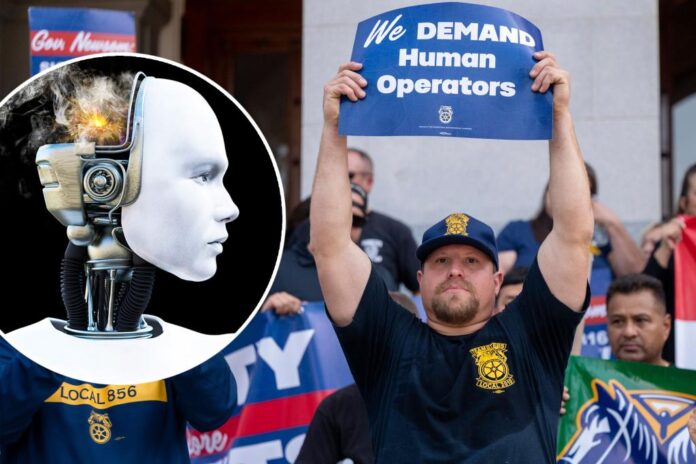Would you let a robot cut your hair?
I’m optimistic about technology and automation, but that particular bleeding edge is one I’d prefer to avoid.
Slide away from the up-close-and-personal nature of barbering, however, and automation looks more attractive. Indeed, slide fully into the digital, industrial, and manufacturing sectors and automation looks positively splendid.
Through the adoption of new technologies, the market has a knack for delivering the things we want and need. These gains do have a flipside, however.
Each step toward automation cuts a bit of work from someone who makes a living from doing it.
Thus, amid a flowering of new tech, we suddenly now find ourselves in an era of national labor strife.
In Hollywood, script writers are striking as online streaming has created a new revenue model and the rise of AI has presented studios with cheaper drafting options.
In the industrial heartland, the United Auto Workers (UAW) are picketing in numbers not seen in decades.
While their top demand is more pay for less work (sounds nice), the UAW is also concerned about worker obsolescence as technology advances.

Electric vehicles, which comprise a larger portion of the market each year, take 40 percent fewer workers to build.
The UAW wants, more than anything, to secure a place for its members as this manufacturing transition unfolds.
Back out in California, another labor storm is brewing as autonomous freight trucking becomes a possibility. In response, the California legislature voted recently to effectively ban driverless trucks.
Governor Gavin Newsom, whose office has been critical of the ban, is now facing the wrath of the truckers’ union as the bill heads to his desk. “We will reach into his closet and take every f***ing skeleton out that’s in there,” threatened one union rep at the prospect of a gubernatorial veto.
In New York, sanitation is a friction point. While most other cities have one-man garbage trucks with hooks and bins to enable mechanized pickup, the city’s collective bargaining agreement guarantees each truck has two workers aboard.
These issues have core aspects in common. In each case, technological advances result in new ways for goods or services to reach customers with far less worker input.
Which is why angry writers, factory workers, truck drivers and trash collectors see such changes as competition.
Workers realize they can’t stop consumers from chasing after lower prices — so they’re trying to block the technologies themselves.

Such an impulse is nothing new. Take that faction of weavers we call the Luddites, who smashed power looms in England two centuries ago.
I talked with Emory University’s Patrick Allitt, a historian of industrialization, about today’s tech-averse workers and those of the past.
“The truckers opposed to autonomous vehicles,” he told me, “are fighting a losing battle. In that sense they are like the Luddites, though luckily they’re non-violent, so far as I know, and therefore unlikely be hunted down by the government.”

Professor Allitt empathizes with today’s workers, but with his historian’s eye sees a picture of broadly-shared progress, even on the labor front. “Every time one set of jobs has disappeared, new ones have appeared and in every generation more of the jobs have been relatively interesting, well paying, and fulfilling.”
In other words, allowing unions to achieve their aims would not only stop innovation, but literally retard social progress. After all, early industrialization not only impacted those hand-loom weavers, it opened a world of economic possibilities to subsistence farmers, as well.
The question today isn’t whether AI, robots, and mechanization are worthy of universal embrace, but who should have the power to decide—and through what means. There’s nothing untoward about collective bargaining efforts, but using strikes and legislatures to impede innovation is something altogether different.

Openness to technological change need not be conceived of as serving some greater good. Sometimes it does — others far less so.
Nonetheless, companies are entitled to solve problems and customers are entitled to the resulting solutions. I may not visit a robo-barber anytime soon.
But if technology can deliver my packages faster, write a funnier script, or produce my next car at a lower price, I’d gladly welcome that option.
Jordan McGillis is a Paulson Policy Analyst at the Manhattan Institute.



